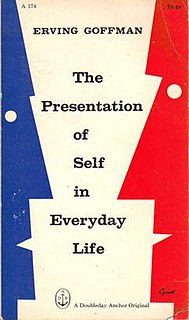 W
WDebt: The First 5,000 Years is a book by anthropologist David Graeber published in 2011. It explores the historical relationship of debt with social institutions such as barter, marriage, friendship, slavery, law, religion, war and government. It draws on the history and anthropology of a number of civilizations, large and small, from the first known records of debt from Sumer in 3500 BC until the present.
 W
WThe Elephant in the Brain: Hidden Motives in Everyday Life is a 2018 nonfiction book by Kevin Simler and Robin Hanson. Simler is a writer and software engineer, while Hanson is an associate professor of economics at George Mason University. The book explores self-deception and hidden motives in human behaviour. The publisher's website describes the aim of the book as 'to track down the darker, unexamined corners of our psyches and blast them with floodlights'.
 W
WThe Presentation of Self in Everyday Life is a 1956 sociological book by Erving Goffman, in which the author uses the imagery of theatre in order to portray the importance of human social interaction; this approach would become known as Goffman's dramaturgical analysis.
 W
WPsychopathology of Everyday Life is a 1901 work by Sigmund Freud, the founder of psychoanalysis. Based on Freud's researches into slips and parapraxes from 1897 onwards, it became perhaps the best-known of all Freud's writings.
 W
WThe Revolution of Everyday Life is a 1967 book by Raoul Vaneigem, Belgian author and onetime member of the Situationist International (1961–1970). The original title literally translates as, Treatise on Good Manners for the Younger Generations. John Fullerton and Paul Sieveking chose the title under which the work appears in English.
 W
WSupercapitalism: The Transformation of Business, Democracy, and Everyday Life (ISBN 0-307-26561-7) is a book written by Robert Reich and published by New York publishing house Alfred A. Knopf in 2007. Reich was President Bill Clinton's Secretary of Labor.
 W
WHenri Lefebvre was a French Marxist philosopher and sociologist, best known for pioneering the critique of everyday life, for introducing the concepts of the right to the city and the production of social space, and for his work on dialectical materialism, alienation, and criticism of Stalinism, existentialism, and structuralism. In his prolific career, Lefebvre wrote more than sixty books and three hundred articles. He founded or took part in the founding of several intellectual and academic journals such as Philosophies, La Revue Marxiste, Arguments, Socialisme ou Barbarie, Espaces et Sociétés.
 W
WFernand Braudel was a French historian and a leader of the Annales School. His scholarship focused on three main projects: The Mediterranean, Civilization and Capitalism (1955–79), and the unfinished Identity of France (1970–85). His reputation stems in part from his writings, but even more from his success in making the Annales School the most important engine of historical research in France and much of the world after 1950. As the dominant leader of the Annales School of historiography in the 1950s and 1960s, he exerted enormous influence on historical writing in France and other countries. He was a student of Henri Hauser (1866-1946).